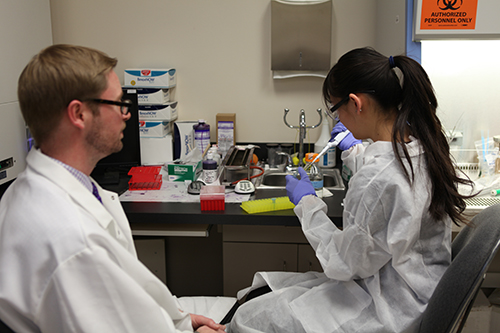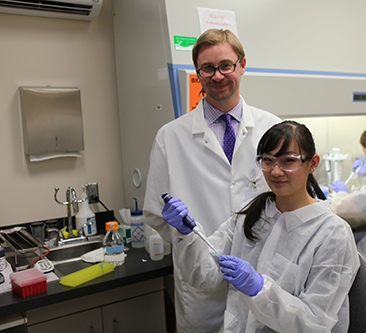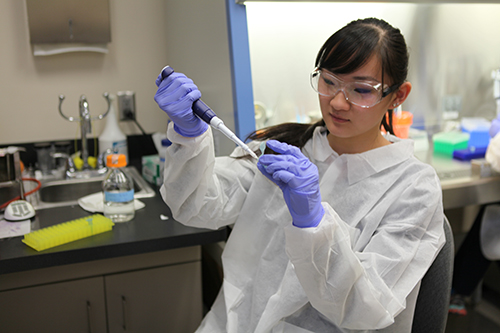WSU Professor Mentors High School Student Who Qualifies for International Science Competition
OGDEN, Utah — At 17 years old, Karissa Wang, a senior at Northern Utah Academy for Math, Engineering & Science (NUAMES), has designed a way to combat drug-resistant bacteria. Her research earned her a spot in the semifinals of a nation-wide science competition.
Wang developed her research under the mentorship of Matthew Nicholaou, an assistant professor of medical lab sciences in WSU’s Dr. Ezekiel R. Dumke College of Health Professions. Their work focuses on a new-gene editing tool called CRISPRs, or clustered regulatory interspaced short palindromic repeats, which are bacterial immune systems that can be used to edit a genome.
Wang is one of 300 students in the country who made it to the semifinals of the Intel Science Talent Search from a pool of 1,750 entrants. She is the only semifinalist from Utah, and one of only a handful from the entire southwest region. Applicants came from 43 states and 512 high schools.
As a semifinalist, Wang received a $1,000 award with an additional $1,000 going to NUAMES.
“For science fair geeks, this is kind of a big thing,” Wang said. “But regardless of what happens, this has been really great research experience.”
 Wang designed a CRISPR system to inactivate antibiotic resistance in bacteria.
Wang designed a CRISPR system to inactivate antibiotic resistance in bacteria.
“There are many organisms that are becoming resistant to almost every kind of drug we have,” Nicholaou said. “Our solution in the past has just been to find another drug, but we’re kind of running out. This technology would recover the usefulness of treatments we already have.”
The idea for the project began in May 2014 when one of Wang’s friends talked about his cousin’s methicillin-resistant staph infection.
“That type of infection is really hard to get rid of because it’s resistant to antibiotics,” Wang said. “On the bus, my friend would give us updates and tell us how terrible it was. I thought it was really scary but I was also kind of curious, so I started doing some research about it, and it evolved from there.”
For months, Wang and Nicholaou spent hours in the lab after school. Nicholaou assigned Wang reading, provided her with lectures and showed her new lab methods to improve her skill level.
Since then, Wang has presented at WSU’s Ritchey Science & Engineering Fair and the Intel International Science and Engineering Fair.
“It’s really important for young people to see and know that this kind of success can happen,” Nicholaou said. “You have to keep nurturing these students and really get involved with them because we need to keep up with the rest of the world. We have many faculty here who are very enthusiastic to do research projects, and all they have to do is come talk to us.”
Visit weber.edu/wsutoday for more news about Weber State University.
For high-resolution photos, please visit the following links:
wsuucomm.smugmug.com/Press-Release-Photos/2016-photos/January-2016/i-zgt8kCC/0/XL/IMG_2371-XL.jpg
wsuucomm.smugmug.com/Press-Release-Photos/2016-photos/January-2016/i-v9VczNp/0/XL/IMG_2390-XL.jpg
wsuucomm.smugmug.com/Press-Release-Photos/2016-photos/January-2016/i-v9VczNp/0/XL/IMG_2390-XL.jpg
Rachel Badali, Office of Marketing & Communications
801-626-7295 • rachelbadali@weber.edu- Contact:
Matthew Nicholaou, medical lab sciences assistant professor
801-626-6101 • matthewnicholaou@weber.edu
